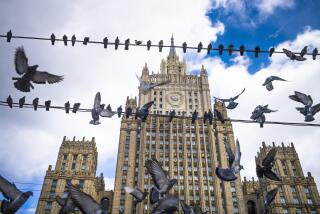The Door Is Ajar
- Share via
This week, for the first time since the Soviet Union broke diplomatic relations with Israel in 1967, high-level officials of the two countries met for pre-announced talks. The meeting, convened at Soviet initiative, was ostensibly to discuss Russian Orthodox Church property in Jerusalem. The plan had been to confer for two days--rather a long time to chew over a real-estate matter that could have been dealt with routinely at a much lower level. As it happens, the talks ended after only 90 minutes. Israel says that more are likely through other channels. The Soviets say that they have nothing in mind for now. No matter. The door that was opened in Helsinki remains ajar.
What are the Russians up to? At a minimum, they have signaled a readiness to get back into more active Middle East diplomacy should the opportunity come along. For the last 19 years they have avoided all formal contacts with Israel while strongly supporting the Arab states and movements most hostile to it. In consequence they have been dealt out of all serious efforts to defuse the Arab-Israel confrontation, from the disengagement agreements in Sinai and the Golan Heights to the Israel-Egypt peace treaty and up through recent diplomatic efforts to find common negotiating ground. Now the Soviets have reestablished direct contact on an innocuous issue, setting a precedent that they can build on if they choose.
It may be that initially they had bolder plans, only to think better of them when their Arab clients loudly protested the Helsinki get-together. Certainly the Russians have taken pains to assure the Arabs that no policy shift is in the works. Israel is interested in getting back onto a normal footing with the Soviets, most of all because it wants to see freer emigration for Soviet Jews. It would also not be averse to raising suspicions in Arab minds about Soviet fidelity to their cause. In Moscow’s view, relaxing emigration would be a stiff price to pay, both domestically and in relations with the Arabs, in order to get back into the Middle East diplomatic game. So the Russians are likely for now to move with caution. At the same time, they have given permission to Hungary and Poland to open cultural and other exchanges with Israel. That kind of thing commits Moscow to nothing, but does serve to show that its options are open.
More to Read
Sign up for Essential California
The most important California stories and recommendations in your inbox every morning.
You may occasionally receive promotional content from the Los Angeles Times.













